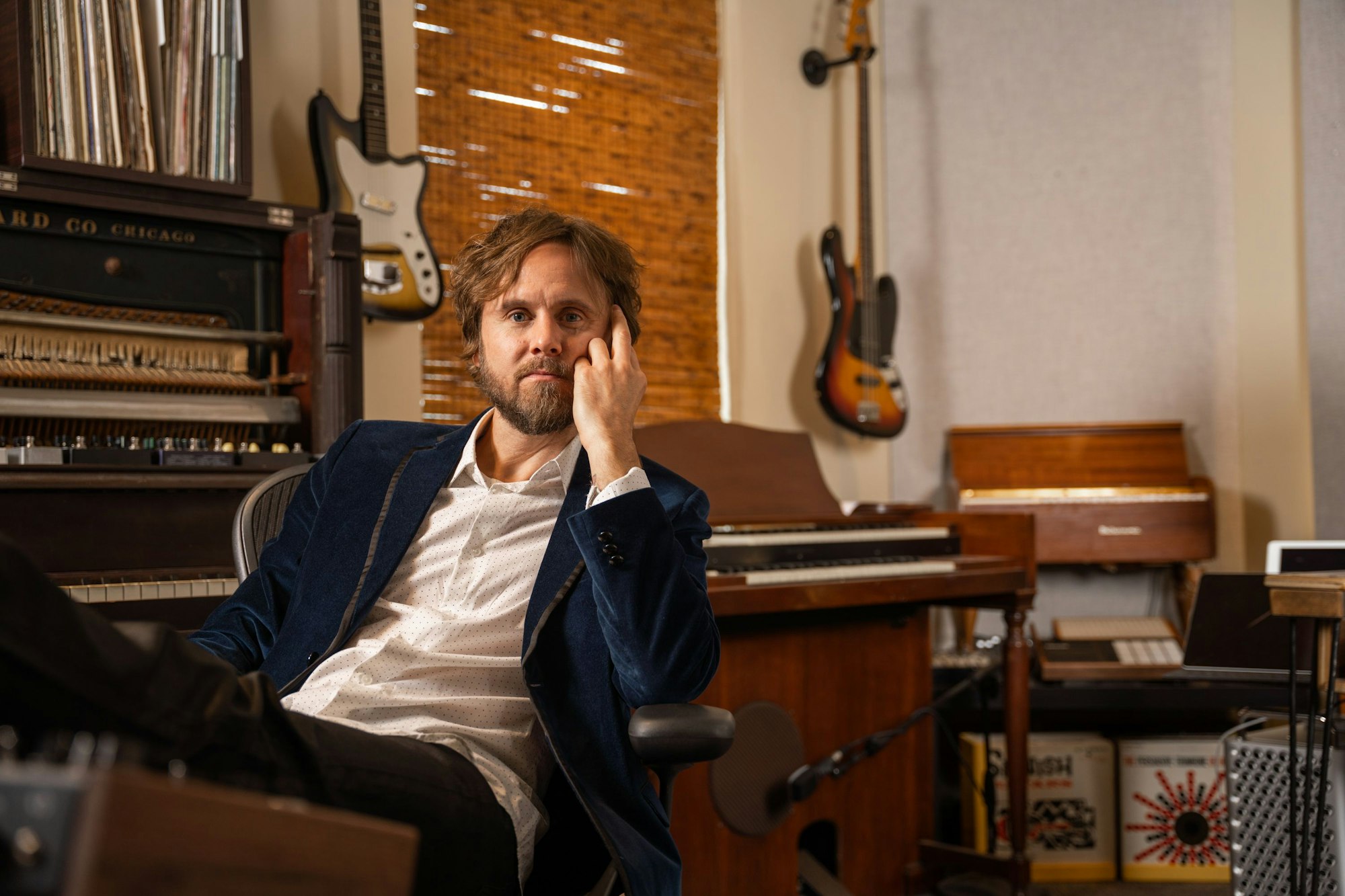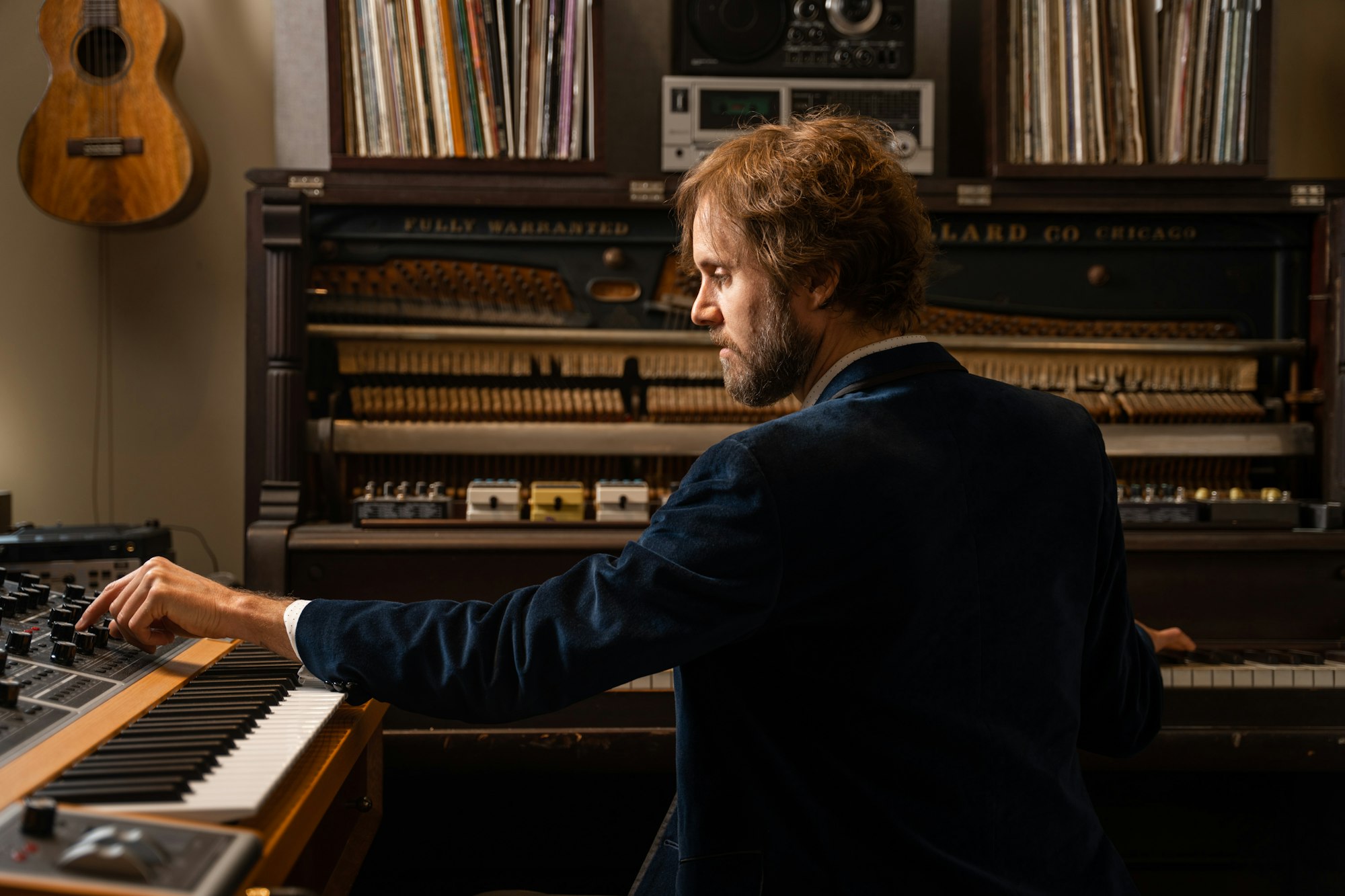Words by Lillian Crawford
Taking over a beloved movie franchise presents a composer with a unique challenge. The 1987 horror Hellraiser, written and directed by Clive Barker, is a classic of the genre.
It features one of the most iconic villains in the canon, Doug Bradley’s Pinhead, who played the character in seven of the original’s nine sequels. He carried with him a wealth of rich musical themes, composed by Christopher Young after he replaced experimental music group Coil on the soundtrack at the insistence of the film’s producers.
The man tasked with writing a new score for the Hellraiser remake, released by Hulu in October 2022, is Ben Lovett. He is a frequent collaborator with the film’s director, David Bruckner, having scored his projects from The Signal (2007) to The Ritual (2017) and The Night House (2020). The challenge for Ben was to create a score that sounded like both a Hellraiser movie and a David Brucker movie, while also furthering his own style as a composer. The result is a unique blend of the synthetic and the classical, of beauty and horror. He talks us through the process of bringing those elements together.

In the credits, themes from Hellraiser and Hellbound: Hellraiser II by Christopher Young are included in the tracklist. How did you approach developing that music and creating something new?
As soon as I came on board the project, I realised that I was entering a world that was already very distinctive and clearly defined by the work that Christopher Young had done on those early films. I needed to re-establish what the sonic terrain of this world was like. For David and myself, we felt it was important to capture the spirit of what Christopher Young had done but also to move it forward to find a new sound that could also describe this world.
As soon as I came on board the project, I realised that I was entering a world that was already very distinctive.
But it wouldn’t have felt like Hellraiser to not try and pull some of those themes into the film. We were very fortunate that he gave us his blessing to reinterpret those themes into our score. The first one you hear are variations on the opening notes to his composition ‘Resurrection’ from the original movie, which felt like a fitting point of inspiration to explore a reimagining of those ideas.
How familiar with Hellraiser were you before joining the project?
I had more of a peripheral relationship with it. I was probably about eight or nine years old when it came out and I remember seeing the cover of the VHS box in Blockbuster and it looked like something that would scare the hell out of you! When I was told about the film I decided to start with Clive Barker’s novel The Hellbound Heart, to go back to the source. Then I read the script for our movie so I had a firm understanding of the story that we’re here to tell. Then I looked at all the other films and all the other material, from Christopher Young’s scores to the unused Coil themes. Even the Motorhead and Ozzy Osborne cover of ‘Hellraiser’; everything that I could get my hands on to inform me on how to tell this story, instead of dragging in a preconceived idea.
I looked at everything that I could get my hands on to inform me on how to tell this story.
A lot of modern horror scores are very synth-heavy so it’s refreshing to hear those classical elements coming through in the music. What is your approach to instrumentation and using electronics?
That comes from knowing the stylistic preferences of your collaborators. I know that as a friend and collaborator of twenty-something years what kind of music David Bruckner really likes and responds to. That isn’t typically classically-designed scores or classical music, but we knew how much that needed to be a part of this film. I wanted to have one foot in the traditional sound of a Hellraiser film and the other in what a David Bruckner movie sounds like. When it does cross over into classical music for him, it’s composers like Krzysztof Penderecki and György Ligeti which requires a kind of experimentation that doesn’t sound good at first but eventually we find things that work really well.
What do you think is distinctive about your score by contrast to the Christopher Young ones?
I think what was so unique about the originals was this juxtaposition of the romantic, sort of gothic writing that Christopher Young did with the coarse, raw imagery of Cliver Barker’s films. That wasn’t something many people had done before 1987. In our film, by contrast, I think that there are a lot more angels rather than demons in the visuals. I’d write something very lyrical and David would love it but ask me if I could rub it around in the dirt and then bring it back. It was to write the music the way that the Cenobites look, which is quite elegant and beautiful from a distance but the closer you get the more horrifying they become. There’s always a sinister element in there lurking around, just on the edges.
I wanted to have one foot in the traditional sound of a Hellraiser film and the other in what a David Bruckner movie sounds like.
That contrast of classical music and horrifying visuals reminds me of Stanley Kubrick’s films, especially the orgy towards the start of Hellraiser with ‘Funerailles’ by Franz Liszt. How much were the melodies in the film inspired by classical music?
I was driving in the car one day and I heard a Rachmaninov piece on the radio which sounded to me like it might have inspired Christopher Young’s original theme. This passing phrase in C-sharp minor gave me an epiphany to spend time listening to music that may have influenced Christopher Young, which included the Liszt piece in that opening scene at the mansion. The challenge put to me there was to decide what this wealthy character would be playing at his deviant mansion sex party, and I wanted something that was proper on the surface but a little naughty underneath. I wondered if I could put 808s on the classical music which is what I played around with, using the hip-hop technique of taking a passage, playing it on the piano, looping it, and putting a trap beat on it. That produces something that feels familiar but a little different.
I drew inspiration from what’s on screen for the instrumentation, and the interiors of their lives made me turn to synths and beats. But then there's also guitars and a harp which follows Riley through the movie. That’s her connection to a more classical world. Harp is a signature element in the scores to the original two films, and I knew we wanted to employ that in ours. It’s one of those elements, like the tubular bells, that just makes it feel like Hellraiser to me. All the harp in the score is performed by Lara Somogyi, who is an excellent harpist and fantastic collaborator.
We had a really wide range of strange harmonic sounds which were, in the spirit of Hellraiser, simultaneously horrible and beautiful.
There was also a lot of experimentation with less traditional sources. We took a stroh violin and stuck a giant gramophone horn onto the end of it, which gave it a really unique sound. I layered a lot of experimental bowed percussion sounds from musician Bobak Lotfipour, who created these wonderful textures that sounded like ghostly vocals using frame drums, gongs, and sheets of metal and copper. There was a prepared ‘bondage piano’ we created by sticking metal chains, wires, and screws into a grand piano. We had everything from ping pong balls taped to the piano strings to a cow bell sitting on the bottom four strings. It was something inspired by the visuals, particularly after Voight has received his ‘gift’ from the Cenobites, and it gave us a really wide range of strange harmonic sounds to employ throughout the score which were, in the spirit of Hellraiser, simultaneously horrible and beautiful.
What was it like approaching a different kind of antagonist from the earlier films?
There was something in how Jaime Clayton delivered that character on screen that I was reacting to and channelling. There’s a divinity to her that is embodied in the performance. David really wanted to bring back the theme for the Cenobites in the original Hellraiser, which is a very bombastic brass fanfare. That felt like Doug Bradley and his version of Pinhead, but when we recorded that theme with Jaime Clayton’s character it just did not work. We wondered if we could be more abstract in our allusion to that melody and put it into voices instead. I smeared that theme into a Penderecki-style cluster chorus which shifts out of time with itself into a blur. Then out in front is Theodosia Roussos, a soloist doing these operatic, aria passages that we improvised. I’d sing something to her and she’d sing something back which we recorded. When we put it to picture it was like a siren call, inviting but sinister.
I don’t write concert music - I’m trying to collect pieces to help the narrative function.
What was the recording process of this score like?
My process is to record in the middle of production. I don’t write and demo it all out and then we just cut it. That’s because David and I are constantly turning things upside down and sticking things together in and up to the final mix. When we feel that an idea is broadly working we record something and then we can manipulate those further. I don’t write concert music, I’m trying to collect pieces to help the narrative function.

In order to do that we divided it by section. We did our strings in Bratislava, brass and choir in London, harp and woodwinds and guitars in Los Angeles, and then I recorded all the piano and percussion and synths at Echo Mountain Studios in Asheville, North Carolina, which has become a regular recording spot for me over the past few years.
Is the plan to develop a new franchise and expand those ideas further?
If so, I hope it’s not starting anytime soon because I need a break! It was remarkably challenging, but more than the appeal of working on a new Hellraiser movie for me was working on a new David Bruckner movie. I’ve been making films with David since we were college kids. I work with all sorts of people now but you take any opportunity to saddle back up and ride off to slay dragons with one of your oldest friends who you came up with learning together. That’s such a rare and wonderful experience. He could tell me we’re remaking the Care Bears movie and I would do it!
Hellraiser is available to stream on Hulu now.
